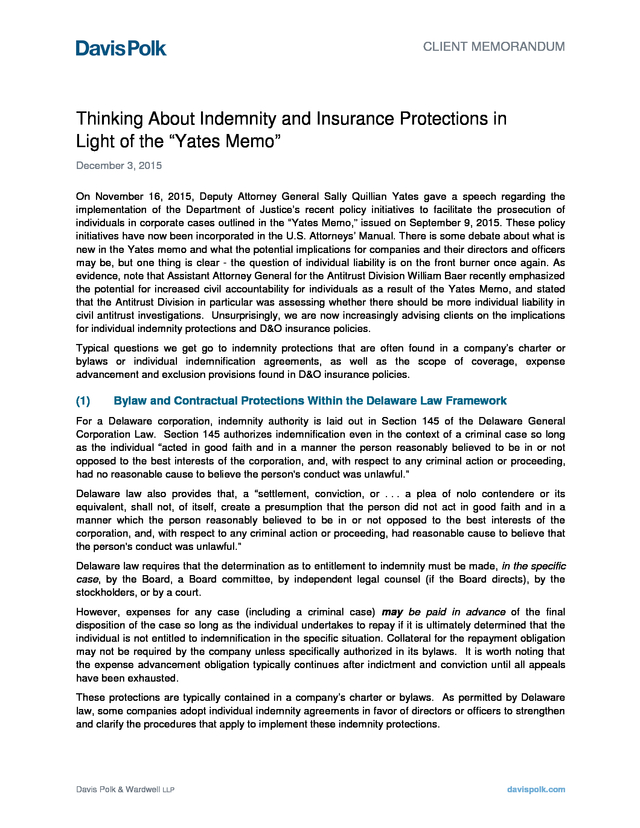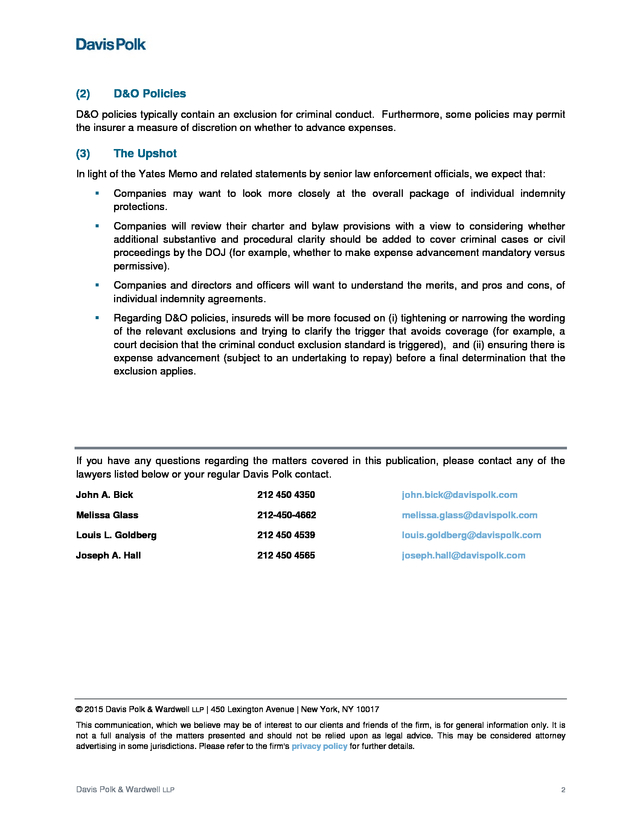Thinking About Indemnity Protections after the "Yates Memo" - December 3, 2015
Davis Polk & Wardwell
Description
CLIENT MEMORANDUM
Thinking About Indemnity and Insurance Protections in
Light of the “Yates Memo”
December 3, 2015
On November 16, 2015, Deputy Attorney General Sally Quillian Yates gave a speech regarding the
implementation of the Department of Justice’s recent policy initiatives to facilitate the prosecution of
individuals in corporate cases outlined in the “Yates Memo,” issued on September 9, 2015. These policy
initiatives have now been incorporated in the U.S. Attorneys’ Manual. There is some debate about what is
new in the Yates memo and what the potential implications for companies and their directors and officers
may be, but one thing is clear - the question of individual liability is on the front burner once again.
As evidence, note that Assistant Attorney General for the Antitrust Division William Baer recently emphasized the potential for increased civil accountability for individuals as a result of the Yates Memo, and stated that the Antitrust Division in particular was assessing whether there should be more individual liability in civil antitrust investigations. Unsurprisingly, we are now increasingly advising clients on the implications for individual indemnity protections and D&O insurance policies. Typical questions we get go to indemnity protections that are often found in a company’s charter or bylaws or individual indemnification agreements, as well as the scope of coverage, expense advancement and exclusion provisions found in D&O insurance policies. (1) Bylaw and Contractual Protections Within the Delaware Law Framework For a Delaware corporation, indemnity authority is laid out in Section 145 of the Delaware General Corporation Law. Section 145 authorizes indemnification even in the context of a criminal case so long as the individual “acted in good faith and in a manner the person reasonably believed to be in or not opposed to the best interests of the corporation, and, with respect to any criminal action or proceeding, had no reasonable cause to believe the person's conduct was unlawful.” Delaware law also provides that, a “settlement, conviction, or .
. . a plea of nolo contendere or its equivalent, shall not, of itself, create a presumption that the person did not act in good faith and in a manner which the person reasonably believed to be in or not opposed to the best interests of the corporation, and, with respect to any criminal action or proceeding, had reasonable cause to believe that the person's conduct was unlawful.” Delaware law requires that the determination as to entitlement to indemnity must be made, in the specific case, by the Board, a Board committee, by independent legal counsel (if the Board directs), by the stockholders, or by a court. However, expenses for any case (including a criminal case) may be paid in advance of the final disposition of the case so long as the individual undertakes to repay if it is ultimately determined that the individual is not entitled to indemnification in the specific situation.
Collateral for the repayment obligation may not be required by the company unless specifically authorized in its bylaws. It is worth noting that the expense advancement obligation typically continues after indictment and conviction until all appeals have been exhausted. These protections are typically contained in a company’s charter or bylaws. As permitted by Delaware law, some companies adopt individual indemnity agreements in favor of directors or officers to strengthen and clarify the procedures that apply to implement these indemnity protections. Davis Polk & Wardwell LLP davispolk.com .
(2) D&O Policies D&O policies typically contain an exclusion for criminal conduct. Furthermore, some policies may permit the insurer a measure of discretion on whether to advance expenses. (3) The Upshot In light of the Yates Memo and related statements by senior law enforcement officials, we expect that:  Companies may want to look more closely at the overall package of individual indemnity protections.  Companies will review their charter and bylaw provisions with a view to considering whether additional substantive and procedural clarity should be added to cover criminal cases or civil proceedings by the DOJ (for example, whether to make expense advancement mandatory versus permissive).  Companies and directors and officers will want to understand the merits, and pros and cons, of individual indemnity agreements.  Regarding D&O policies, insureds will be more focused on (i) tightening or narrowing the wording of the relevant exclusions and trying to clarify the trigger that avoids coverage (for example, a court decision that the criminal conduct exclusion standard is triggered), and (ii) ensuring there is expense advancement (subject to an undertaking to repay) before a final determination that the exclusion applies. If you have any questions regarding the matters covered in this publication, please contact any of the lawyers listed below or your regular Davis Polk contact. John A. Bick 212 450 4350 john.bick@davispolk.com Melissa Glass 212-450-4662 melissa.glass@davispolk.com Louis L. Goldberg 212 450 4539 louis.goldberg@davispolk.com Joseph A.
Hall 212 450 4565 joseph.hall@davispolk.com © 2015 Davis Polk & Wardwell LLP | 450 Lexington Avenue | New York, NY 10017 This communication, which we believe may be of interest to our clients and friends of the firm, is for general information only. It is not a full analysis of the matters presented and should not be relied upon as legal advice. This may be considered attorney advertising in some jurisdictions.
Please refer to the firm's privacy policy for further details. Davis Polk & Wardwell LLP 2 .
As evidence, note that Assistant Attorney General for the Antitrust Division William Baer recently emphasized the potential for increased civil accountability for individuals as a result of the Yates Memo, and stated that the Antitrust Division in particular was assessing whether there should be more individual liability in civil antitrust investigations. Unsurprisingly, we are now increasingly advising clients on the implications for individual indemnity protections and D&O insurance policies. Typical questions we get go to indemnity protections that are often found in a company’s charter or bylaws or individual indemnification agreements, as well as the scope of coverage, expense advancement and exclusion provisions found in D&O insurance policies. (1) Bylaw and Contractual Protections Within the Delaware Law Framework For a Delaware corporation, indemnity authority is laid out in Section 145 of the Delaware General Corporation Law. Section 145 authorizes indemnification even in the context of a criminal case so long as the individual “acted in good faith and in a manner the person reasonably believed to be in or not opposed to the best interests of the corporation, and, with respect to any criminal action or proceeding, had no reasonable cause to believe the person's conduct was unlawful.” Delaware law also provides that, a “settlement, conviction, or .
. . a plea of nolo contendere or its equivalent, shall not, of itself, create a presumption that the person did not act in good faith and in a manner which the person reasonably believed to be in or not opposed to the best interests of the corporation, and, with respect to any criminal action or proceeding, had reasonable cause to believe that the person's conduct was unlawful.” Delaware law requires that the determination as to entitlement to indemnity must be made, in the specific case, by the Board, a Board committee, by independent legal counsel (if the Board directs), by the stockholders, or by a court. However, expenses for any case (including a criminal case) may be paid in advance of the final disposition of the case so long as the individual undertakes to repay if it is ultimately determined that the individual is not entitled to indemnification in the specific situation.
Collateral for the repayment obligation may not be required by the company unless specifically authorized in its bylaws. It is worth noting that the expense advancement obligation typically continues after indictment and conviction until all appeals have been exhausted. These protections are typically contained in a company’s charter or bylaws. As permitted by Delaware law, some companies adopt individual indemnity agreements in favor of directors or officers to strengthen and clarify the procedures that apply to implement these indemnity protections. Davis Polk & Wardwell LLP davispolk.com .
(2) D&O Policies D&O policies typically contain an exclusion for criminal conduct. Furthermore, some policies may permit the insurer a measure of discretion on whether to advance expenses. (3) The Upshot In light of the Yates Memo and related statements by senior law enforcement officials, we expect that:  Companies may want to look more closely at the overall package of individual indemnity protections.  Companies will review their charter and bylaw provisions with a view to considering whether additional substantive and procedural clarity should be added to cover criminal cases or civil proceedings by the DOJ (for example, whether to make expense advancement mandatory versus permissive).  Companies and directors and officers will want to understand the merits, and pros and cons, of individual indemnity agreements.  Regarding D&O policies, insureds will be more focused on (i) tightening or narrowing the wording of the relevant exclusions and trying to clarify the trigger that avoids coverage (for example, a court decision that the criminal conduct exclusion standard is triggered), and (ii) ensuring there is expense advancement (subject to an undertaking to repay) before a final determination that the exclusion applies. If you have any questions regarding the matters covered in this publication, please contact any of the lawyers listed below or your regular Davis Polk contact. John A. Bick 212 450 4350 john.bick@davispolk.com Melissa Glass 212-450-4662 melissa.glass@davispolk.com Louis L. Goldberg 212 450 4539 louis.goldberg@davispolk.com Joseph A.
Hall 212 450 4565 joseph.hall@davispolk.com © 2015 Davis Polk & Wardwell LLP | 450 Lexington Avenue | New York, NY 10017 This communication, which we believe may be of interest to our clients and friends of the firm, is for general information only. It is not a full analysis of the matters presented and should not be relied upon as legal advice. This may be considered attorney advertising in some jurisdictions.
Please refer to the firm's privacy policy for further details. Davis Polk & Wardwell LLP 2 .













